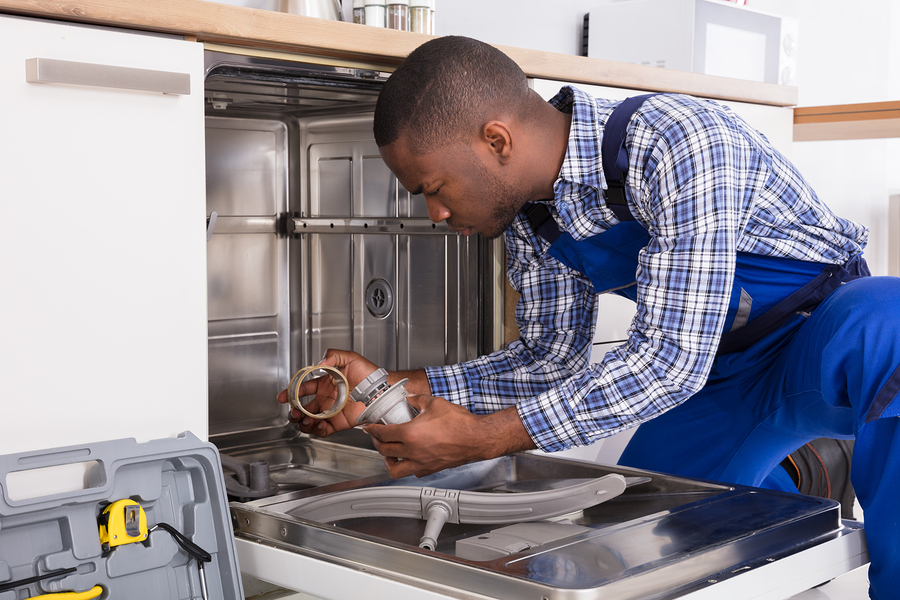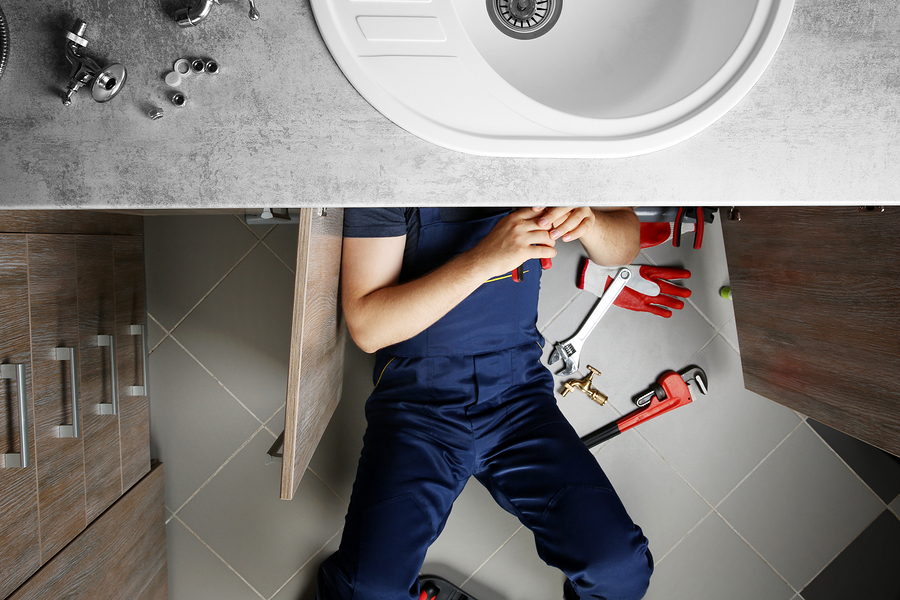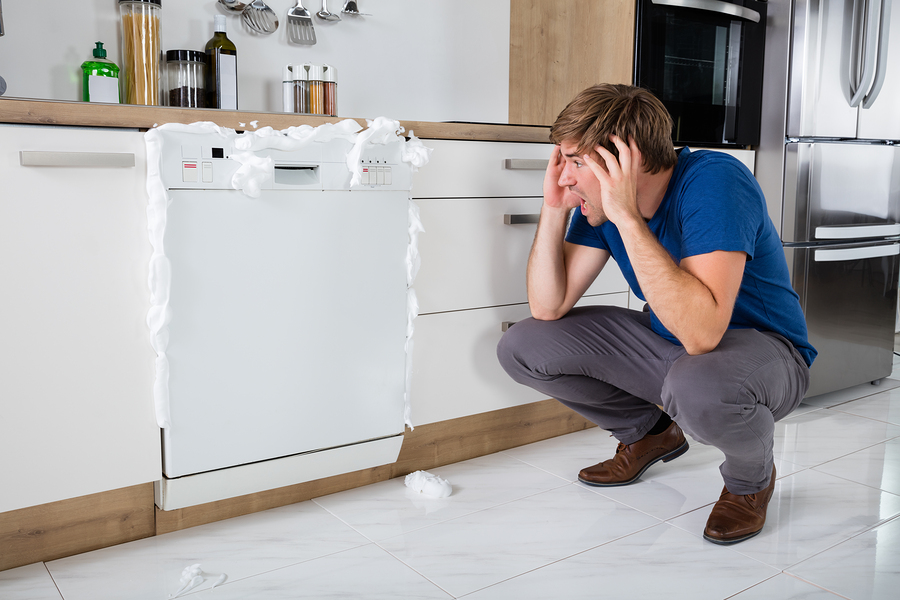Dishwasher Won’t Drain Water? Troubleshooting Tips
Date: April 14, 2018
ARTICLES
DISHWASHER WON’T DRAIN WATER? TROUBLESHOOTING TIPS
APR 13, 2018
When an appliance stops working, the first thing you think of is the cost of replacing it. If your dishwasher won’t drain, you may be thinking that you are in for some costly repairs or replacement of the unit, but that might not necessarily be the case. Before you call a repairman, you can do some troubleshooting on your own to see if the problem is the appliance or if you need to call a plumber. If you need to call a plumber, you can rest assured that it will be worth the time spent to have an idea of where the problem lies beforehand.
DIAGNOSING THE PROBLEM WHEN YOUR DISHWASHER WON’T DRAIN WATER
If your dishwasher won’t drain or only drains partially, there are two major areas where the problem could lie. It is either with the dishwasher and connections, or in your plumbing. This is the first piece of information that you need to determine. If you do not, then there is a risk that you could call the wrong repairman and have to pay two different bills for the same issue. Tracing the problem to these two areas can help save the inconvenience (and sometimes expense) of having to call out two different services.
THE FIRST MAJOR QUESTION
The first question that you need to ask is if only the dishwasher is affected, or if there are other drains not draining as well. If the problem affects your dishwasher as well as other areas like toilets, sinks, basement drains, or showers, you already know that the dishwasher might not be the culprit. However, the dishwasher could be a contributing factor, so you cannot rule it out completely.
Determining what is affected can help you pinpoint the problem. For instance, if it is centered around the dishwasher and adjoining sink but not the bathroom, then it can give you a clue as to the location. A problem with either the dishwasher or the sink could be affecting both of them. If it affects more than one bathroom and the kitchen, you should probably just stop and call a plumber because it is a bigger problem that affects the entire plumbing system.
CHECK YOUR GARBAGE DISPOSAL
Before we get started, a simple fix to your dishwasher not draining properly could lie within your garbage disposal. It is really easy for bits of food to clog the drain hose that is connected to your dishwasher. So to be sure this isn’t the issue, run your garbage disposal first and then turn on your dishwasher for a short cycle. When the cycle is over, see if the water has drained properly. If it hasn’t, then move on to these next steps to diagnose the issue.
COMMON DISHWASHER PROBLEMS
One of the most common problems that can cause a dishwasher not to drain usually lies inside the hose. You should always disconnect the power supply to the dishwasher before attempting any repairs or diagnosis. Be sure to turn off the circuit breaker instead of just turning off the power switch.
The first thing to check is the drain hose and drain hose clamp. If there is a kink in the line or the line is clogged, then you either need to clear the clog, or straighten the kink. To check for a clog, you can disconnect the hose by loosening the clamp and blowing into the end of the pipe. If the pipe is clear, then you can reconnect the hose.
If the hose is clear, check the connection point where the hose connects to the sink. Sometimes corrosion builds up and blocks the inlet. This can be cleared with a screwdriver or wire brush. Some dishwashers have a valve that keeps water from flowing back into the dishwasher. If your model has this valve, check to make sure that it moves freely. If it does not move, it will need to be replaced, but this is a small repair.
The next thing to check is the filter at the bottom of the dishwasher. Just like the trap in your sink, if this gets clogged with food the dishwasher will not drain properly. This can be found at the bottom of the dishwasher underneath the arm. Some are located at the back of the dishwasher tub. If you are not sure of the location, you should consult your owner’s manual. Clearing the filter of food may solve the problem. Rinsing your dishes before placing them in the dishwasher will prevent this in the future.
IS IT TIME FOR A PLUMBER?
If you have tried these steps, then the next place to look is the plumbing. If the kitchen sink is clogged, then your dishwasher will not drain either. You could always try running the garbage disposal to clear any food or debris in the sink. As mentioned earlier, running your disposal before starting your dishwasher can help to avoid problems. Be sure to run plenty of water when running your garbage disposer.
Some local areas require that an air gap be installed to prevent a clogged drain from backing into the dishwasher. To see if you have one, look for a chrome cylinder at the back of the sink under your counter. If you have one, remove the chrome cover of the cylinder by unscrewing it. You can then remove any accumulated food or debris. Check the hose from the air gap to the drain to make sure that it is not clogged. This hose might also go to your garbage disposal, too. You can then replace the hose and screw the air gap cap back on.
If your dishwasher does not have an air gap installed, this could be the problem. Without an air gap, the dishwasher may be draining completely, but water may be creeping back in. If this is the case, you might want to have a professional install an air gap, even if they are not required.
If you have done these steps and your sink is still clogged, then the problem might lie beyond the dishwasher connection to the sink. In this case, it may be time to call a plumber. Although it is possible to clean a clog in this area yourself, there are many techniques that may clear the clog, but may ruin your dishwasher in the process.
WHAT NOT TO DO
If your sink is clogged and you have a dishwasher, do not use a drain cleaner. They are corrosive and caustic. This means that you could instantly dissolve your rubber seals and metal parts which will lead to even more costly repairs than deciding to call a specialist who knows how to do it safely.
If you overfill your dishwasher with detergent or use the wrong kind of detergent, it can cause too many suds and can clog the drain. This can also result in water on your floor. You should never use regular hand washing dish soap in a dishwasher for this reason and only use soap that is formulated for automatic dishwashers.
You should always clean out any caked dry soap from the dispenser and break up any lumps of dry detergent. It can cause a clog and cause your dishwasher not to drain properly.
There are certain rules for what you can and cannot place down your kitchen sink. These same rules apply to your dishwasher. Common causes of clogs are coffee grounds, rice, pasta, celery, asparagus, grease, cooking fat, paint, plastic wrap, paper towels, eggshells, and similar items. Remove any food from dishes before placing them in the dishwasher to avoid clogs.
PROBLEM STILL NOT RESOLVED?
As you can see, there are some things that you can try yourself to fix, or at least diagnose the issue. If you have tried these steps and still cannot find the problem, it may be time to call a professional who specializes in comprehensive plumbing services. Donley Service Center can repair faucets, drains, sewer lines, water heaters, floor drains, gas pipes and more. We also have the ability to use high pressure water to clear pipes, and have cameras available to help take the guesswork out of finding the problem. We offer fast and courteous service to get your plumbing or dishwasher back in service as quickly as possible.



